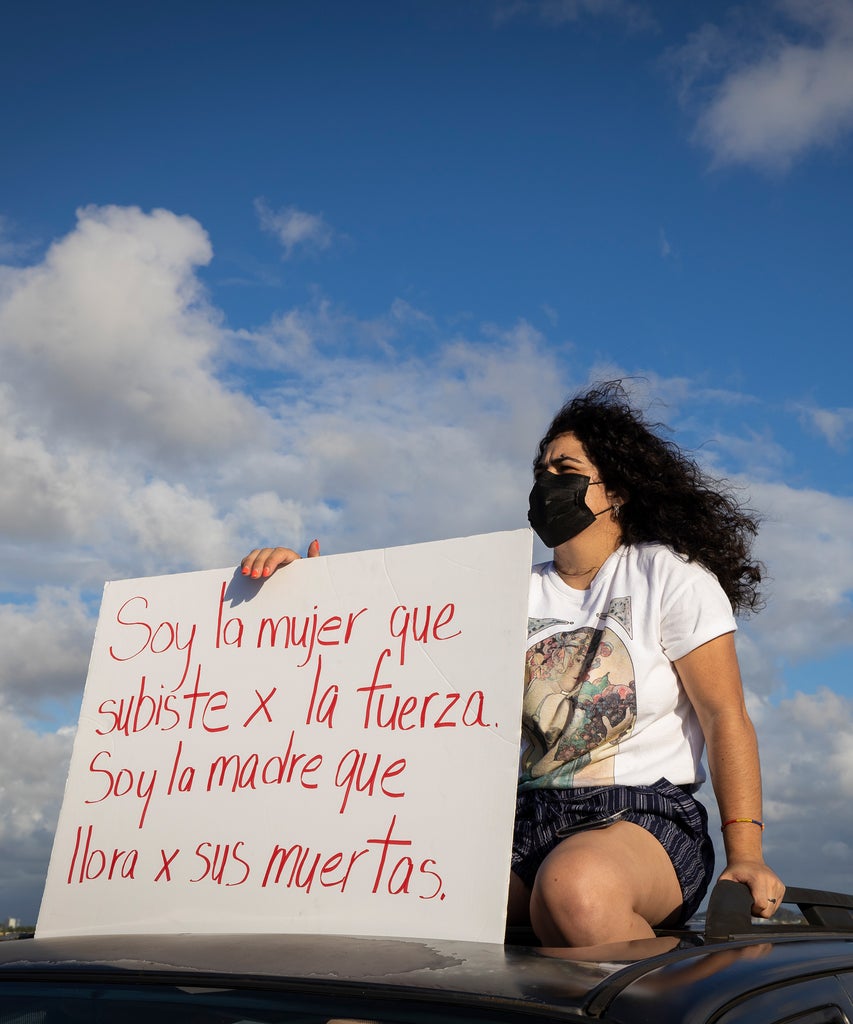
People gather at the Teodoro Moscoso bridge in order to protest and demand justice for the most recent feminiced against Keishla Rodríguez and Andrea Ruiz Costas, in San Juan, Puerto Rico, on May 2, 2021. (Photo by Alejandro Granadillo/NurPhoto via Getty Images)
Puerto Rico’s femicide crisis reached new heights last weekend when 26-year-old Keishla Rodríguez and 35-year-old Andrea Ruiz were murdered by their partners in gruesome acts of gender violence. The island is now in collective mourning, fueled by years of government negligence and an escalating wave of gender violence that continuously leaves women like Rodríguez and Ruiz vulnerable.
“Sadly, these cases have revealed the deep failures of the system that’s supposed to help and protect women,” Zoán Dávila Colón, spokesperson for La Colectiva Feminista en Construcción, a grassroots feminist collective, tells Refinery29. “We continue to hear excuse after excuse and no action.”
The brutal murders of Rodríguez and Ruiz prove that Puerto Rico’s government can no ignore its own culpability, “sending thoughts and prayers” every time a woman is killed.
Both Rodríguez and Ruiz voiced concerns over their partners’ violent and hostile behavior to their families, and in Ruiz’s case, the authorities. Rodríguez was reportedly involved in a 10-year relationship with boxer Felix Verdejo, who is married, and had become pregnant with his child. Authorities say Verdejo allegedly plotted her murder after Rodríguez told him she was pregnant, then drowned Rodríguez at the San José Lagoon in San Juan after beating and drugging her. In Ruiz’s case, the 35-year-old had allegedly filed twice for a restraining order against her ex-boyfriend in late March 2021. A judge in the municipality of Caguas denied her multiple petitions, and is now under investigation after Ruiz’s body was found partially burned in the town of Cayey.
The details of Rodriguez’s and Ruiz’s cases are too familiar in Puerto Rico. Many know a mother who has been denied a restraining order because of a lack of evidence or a friend threatened by an estranged boyfriend when she became pregnant. Yet, machista jokes are dismissed at family parties. Women are victimized and blamed for their own gruesome deaths. Men are still taught that a “no” possibly means “maybe.” Then, women are told to seek help from authorities, only to find no aid in the systems created to protect them — and when they are killed, we dismiss the deaths as “crimes of passion” or “amores que matan.”
This reality is far from passion or love. It’s rooted in our intrinsic and systemic relationships with gender violence. We fail to understand that gender violence is not supposed to be el pan nuestro de cada día, but the system keeps it that way.
In Puerto Rico, one woman is killed every seven days, a number that resonates in Latin America and the Caribbean countries suffering from a latent femicide crisis. The Colectiva, along with other organizations on the island, have demanded a state of emergency declaration since 2018. Back then, one woman was killed every eight days, and the Colectiva signaled that the financial crisis and consecutive natural disasters on the island would result in an increase in gender violence. Neither Governor Ricardo Rosselló — forced to resign in 2019 following a wave of historic protests — nor his successor Governor Wanda Vázquez declared the state of emergency, ignoring the crisis for years. The Colectiva’s warning became a reality: In 2020, 60 women were killed in Puerto Rico because of their gender, according to the Observatorio de Equidad de Género, and more than 5,000 domestic violence reports were filed.
Despite Governor Pierluisi’s state of emergency declaration in January 2021, no concrete action plan has been laid out, says Dávila, and feminist collectives who pushed for the estado de emergencia have not been included in the process. “At this point, we don’t expect them to,” Dávila adds.
Victim after victim, case after case, the government has failed to address its role in this crisis, restricting women of their inalienable right to be protected. Keishla Rodríguez and Andrea Ruiz deserved better. So did Rosimar Rodríguez Gómez, Michelle Ramos Vargas, Alexandra Cardona Torrado, Suiliani Calderón Nieves, Marilyn Reyes Ayala, and the hundreds more women killed in Puerto Rico.
Today, as Puerto Rico mourns their deaths, feminist collectives are back on the streets, demanding the government to rise to the occasion by any means necessary. The Colectiva Feminista en Construcción is headed back to La Fortaleza — the scene of 2019’s Ricky Renuncia protests — where they first held a days-long “plantón” to demand the state of emergency in 2018. This time, Dávila says, the Colectiva is demanding the approval of an actionable plan to enact the state of emergency that’s remained in limbo since January 2021.
“It’s clear that the only ones who are responding to this crisis are the very women and collectives living this violence every single day,” says Dávila. “The government is absent.”
Click HERE to get the BEST Discounts.
You can publish this article on your website as long as you provide a link back to this page.

Be the first to comment